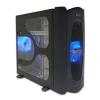Regards: Fred and any others saying it is ok to leave computer case plugged in while working inside it.
ABSOLUTELY, NEVER, EVER STICK YOUR HAND(S) INTO A OPEN COMPUTER CASE WITH THE COMPUTER CASE PLUGGED IN -- REGARDLESS OF WHETHER OR NOT THE COMPUTER CASE POWER SWITCH IS ON OR OFF.
Not only hazardous shock possible but a dangerous if not fatal possibility. There always exist the remote possibility of a wall plug being wired backwards or be dirty, wet, moist and therefore "a leakage possible condition" causing trouble.
The power supply will have residual voltage on its output When the case is unplugged or the power switch is turned off. This residual voltage will discharge fully in a short time -- so give it several minutes. ZBURNS



















 Sign In
Sign In Create Account
Create Account

